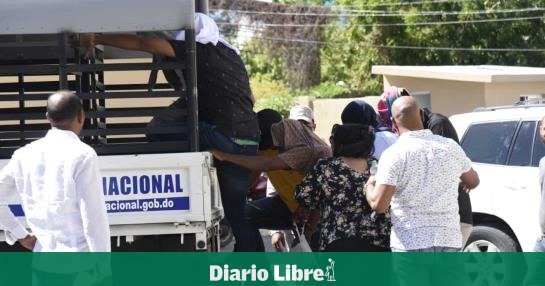The road to the referendum for 135 articles of the urgent consideration law was paved. Despite the rich democratic culture of the country, shocked, referents from one side and the other accused each other of having the worst intentions and wanting to harm everyone’s country with their political vision. This extremist position, in some specific cases, was transferred to militancy, which had crosses like the one that occurred in Cerro, when a Yes militant wanted to kick out his No peers. But the rudeness that is replicated in media and social networks, no It is usually translated into the daily reality of Uruguayans.
“We start from a very simple thing: if we want democracy and we want a democratic and republican government, we have to start at home to make democracy, if we cannot start at home we cannot aspire to everyone being a democrat”, summarized Raúl Chiesa. He is a Frente Amplio member, he is a member of a base committee and on March 27 he votes Yes to repeal 135 articles of the law of urgent consideration. He has been married for 15 years to Rubí de Freitas, of white Herrerista lineage and also a militant, who will vote No next Sunday. Everyone knows their differences: from his only balcony there are two posters that call for voting the opposite.
“People pay a lot of attention to it. They laugh. They will think that one walks with a knife and the other with a revolver and no, they are actually identifications. That’s me and that’s him,” she told The Observer.
The bullets of politics do not enter their marriage. A few days before the elections, it generates the occasional minor shock. The Solomonic solution they found is to touch the subject as little as possible. Although Chiesa is the one who tends to be tempted and make de Freitas angry. That’s when her granddaughter Lucía, also a Sí militant, intercedes and asks her grandfather to moderate.
“I don’t talk about politics with him. He talks to me. He goes to his meetings and tells me what they do and talk about. I really don’t care. I look at it, I listen to it, but I don’t hear it. I’m already programmed for that,” said De Freitas. Despite that, she warned that she would never fight with him about it: “No, that does not go with me. Neither for politics, nor for football, nor for anything. I am very wide. I accept everything, unless they touch my ear”. She has three children and he has four. They all vote for No.
They met in 2004. He went to join the Association of Members of the Caja de Profesionales, where she was secretary of the board. He couldn’t do it and he came back in the first months of 2005. After that, they started going to dance tango at the Parque Hotel and they started dating. At the end of the year they moved in together and two years later they got married.
De Freitas says that she married a man who did not have a political party, “he ate whatever you gave him” and did not have a soccer team. Today she lives with a militant front winger, a vegetarian and a fan of Liverpool.
She, who has always been a blacksmith, came to accompany him to base committees to carry out their work. “I was his secretary, it was not my party but I accompanied him, it is logical. I was going to join a base committee, which I don’t like at all, and everyone called me ‘comrade’. Until one day I got angry and told him ‘no, stop, I’m going to tell you something, I accept the word companion because they are words of Aparicio Saravia, I’m white’. ‘No, it can’t be’, they told me. Sure, I accompanied my husband, which is logical. Now I no longer accompany him in politics, ”she warned. In any case, she sometimes complains: “I have had nephews’ weddings who are all from the National Party and I am a widow. He does not accompany me, but he gets up at 4 in the morning and at 8 at night he is sleeping”.
Leonardo Carreno
Rubí de Freitas votes No and her husband Raúl Chiesa votes Yes
His grandfather had been a close friend of Luis Alberto de Herrera and his father had been his secretary. what turned her “white by tradition, by conviction and above all a blacksmith” from the age of 8. As a teacher, she never participated in union activity although that earned her a nickname. “When there was a one-month strike during the Sanguinetti period, I went to work. What’s more, the boys would pick me up at the bus stop and accompany me to enter. They didn’t mess with Rubí, ”she recalled.
It was one of the first things Chiesa found out about her. “And I, keep my mouth shut,” she said and laughed.
His path to militancy was different. His father, a Batllista, brought to his house only newspapers that were linked to the Colorado Party. But in his first election he was influenced by a white-born friend and ended up voting for the National Party. “Although, mind you, I was never a blacksmith,” he quickly clarified. All this “until a moment came when I realized that with the National Party we were not going anywhere and in 1971 when the creation of the Broad Front was decided, I voted for it.”
In 2008 he began to militate daily for the party. She had been thinking about it and was finally convinced. He is currently the finance secretary of the committee, delegated to the coordinator M by the Trouville committee. Before, he was secretary of propaganda of the coordinator.
Did you read the LUC?
De Freitas: Yes. I totally agree with everything. If we are going to start analyzing the articles that are going to be put to a referendum, you can see that there are some that were voted unanimously. Why are they asking for the referendum? I do not know.
Chiesa: Yes, obviously and I am determined to vote Yes. I was one of those who was convinced from the beginning. It was inadmissible that they are in force when the parliamentarians of the Broad Front did not have the opportunity to study them and reasonably discuss the issue. There was a parliamentary majority of the coalition and what could be done was done. There are a few articles that I understand very important to repeal. As a former official of the Colonization Institute, I do not agree with the points that have to do with Colonization, I do not agree with the issue of express evictions either. Neither with the salary issue and neither with the education issue, it can’t be that teachers can’t handle the issue of education.
Did you see the president on the chain?
De Freitas: I saw it, excellent. I like it a lot, I’m very proud to have voted for it. Although he was not a person I liked, for the 2019 elections in which I was deeply involved, I began to know him and listen to him and he is a very intelligent and very capable person. Very proud.
Chiesa: Yes, I didn’t like it. I think he had a lot of things left to say. He seemed very lazy to me.
How do you see the role of the FA?
De Freitas: Let’s see, I know that I am a No voter, I am convinced with the LUC and I see that many traps and comments are being made out of place. There are things that are not real and they have to see that, just as I would also criticize one of mine if they did the same.
Chiesa: “I think that in the 15 years of the Broad Front government there were a number of incredible achievements. We can see it on the health side, the tax reform (which has some things that can be improved), the issue of the eyes in Saint Bois, which gave sight to many people who did not know his grandchildren. That he has made mistakes? Yes, of course, there are colleagues who did not know how to carry out what the majority thinks, but oh, that’s life.
The student movement united them and politics did not separate them
Lucía and Martín – whose names are fictitious at their request, who fear, so few days before the referendum, the impact of their comments on their political groups – met as student delegates at a high school in the interior. As friends, they would engage in debates for hours on how to improve the situation of students, how to make themselves heard and how to reverse the “adult-centric” vision that was imposed on education.
Looking back, they don’t remember having too different positions on any issue. But more than two years later, they are dating and on politically opposite paths. He, a nationalist militant and with a position as a result of that. She, a fervent Front-Among militant and Yes for the repeal of the 135 articles of the LUC.
In dialogue with El Observador, she said that when they began the relationship, each one was already linked to their respective party. “That’s why there were no strange reactions, when the relationship began, we were both clear about what we were doing,” she said.
Despite the diametrically opposed position they maintain politically, that does not cause friction. “It did not exist because we chose to be together, each of us already having a role. From the first moment, respect prevailed and there was that attractive thing about knowing the other side, discussing and ending up having very long talks. Discussion, exchange and criticism are part of everyday life for us. We get along quite well because we prioritize listening to each other a lot, contrary to popular belief, we often agree,” he said.
In addition, the two actively militate for their ideas, but their differences “add up a lot,” he said. “Democracy in our country ends up being just that, dialogue between the parties is fundamental. It has happened to us, many times, and more so in the campaign, of having different positions, not agreeing, but we know that we both end up wanting the best for the country from the place we choose, ”he valued.

















